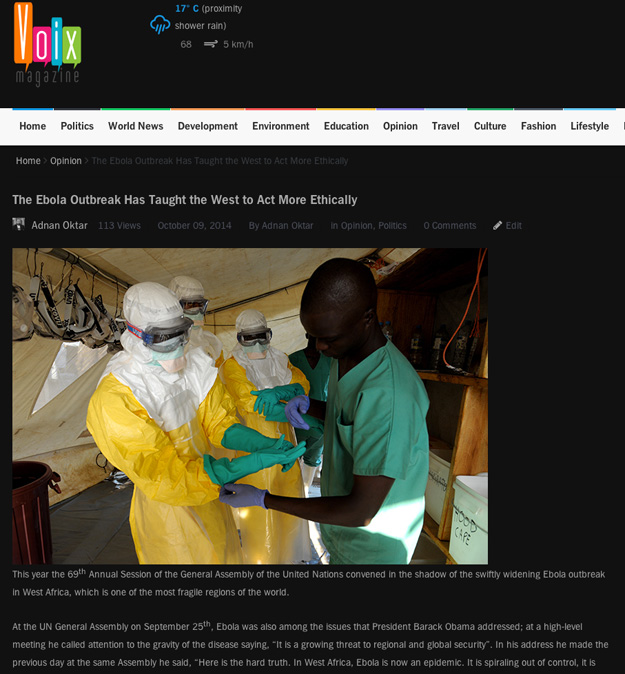
This year the 69th Annual Session of the General Assembly of the United Nations convened in the shadow of the swiftly widening Ebola outbreak in West Africa, which is one of the most fragile regions of the world.
At the UN General Assembly on September 25th, Ebola was also among the issues that President Barack Obama addressed; at a high-level meeting he called attention to the gravity of the disease saying, “It is a growing threat to regional and global security”. In his address he made the previous day at the same Assembly he said, “Here is the hard truth. In West Africa, Ebola is now an epidemic. It is spiraling out of control, it is getting worse, it is spreading faster, and exponentially.”
Meanwhile, speaking at the end of his weekly audience with pilgrims in St. Peter’s Square, Pope Francis spoke out about the epidemic for the second time in just 24 hours and said that his thoughts went to those countries in Africa that are suffering because of the outbreak of Ebola. He said, “I hope the international community may provide much needed help to alleviate the suffering of our brothers and sisters.”
As world leaders draw attention to the gravity of the issue, it goes without saying that the efforts to respond to the threat so far has been handled quite negligently and with shortsightedness. The basic principle of the essentiality of immediate and outright eradication of any infectious disease has been clearly ruled out in this very typical case.
What began as a few cases in December 2013 in Guinea has, in six months, snowballed into 5,800 cases, as confirmed by WHO, because back then the local health workers, lacking the back-up of qualified western prevention initiatives, couldn’t handle the cases properly and take essential measures of quarantine.
According to a recent report issued by the Centers for Disease Control and Prevention on September the 23rd, in the worst-case scenario, if the disease keeps spreading without effective methods to contain it, Liberia and Sierra Leone can have a total of 21,000 cases of Ebola by Sept 30thand 1.4 million cases by January 20th.
Gayle Smith, a special assistant to President Obama and senior director of the National Security Council said, “Perhaps most important, Ebola has reached the point where it could establish itself as an endemic infection because of a highly inadequate and late global response.”
Amid this grave picture, a statement issued after the second meeting of Emergency Committee of World Health Organization (WHO) held during the third week of September said, “The Committee strongly reiterate that there should be no general ban on international travel or trade, and quarantines may be deemed necessary in areas of intense and widespread transmission of the deadly Ebola virus.”
The Committee bases this suggestion on the need to provide information, essential services and food and water, to the affected populations.
However adoption of this approach would be a major mistake. First and foremost, it is definitely not contributive to the eradication of the disease. As in any other epidemic or any infectious disease, enforced isolation, in other words, a quarantine, is an essential and indispensable measure so as not to expose the healthy population to the disease. Furthermore, a quarantine must not be limited only to the isolation of the people who have contracted the disease in the treatment centers but must be nationwide, banning all kinds of transportation via sea, land and air to and from the infected countries. Today’s rapid means of travel would be a great factor in bringing the disease to far destinations across the world.
The regional lockdown in Sierra Leone for three days, which was hailed as a huge success by authorities, and later widened to three more districts, has proved the workability and success of this method. During the curfew health workers found almost 100 people who perished from the disease and another 56 who have been infected, and with people delivering essential services entering and circulating, essential services did not cease.
It is clear that such a nationwide isolation will enable the authorities to curtail the spread far more effectively. So speaking of free transportation to and from the affected countries should definitely not be an option.
Meanwhile there is an unethical aspect of Western health institutions’ failure to address the problem: The lack of motivation to develop effective vaccines. The UK’s leading public health doctor, Professor John Ashton, president of the UK Faculty of Public Health makes this point very clear in his comment in The Independent,[1]: “Western drug firms have not tried to find a vaccine because virus only affects Africans”. He said, “The West needs to treat the deadly virus as if it were taking hold in the wealthiest parts of London rather than just Sierra Leone, Guinea and Liberia.”
However now that the first case of the Ebola virus is diagnosed on US soil as of September 30th, it seems that drug companies might feel the urge to overcome their negligence and speed vaccines and potential cures. In this particular case, the patient who carried Ebola virus arrived to the US without displaying any symptoms of the virus, yet nine days later he was diagnosed with Ebola and put in isolation. This case sets off alarm bells and calls for immediate and urgent need for developing a cure.
There is no doubt that the disease has become an international threat, which has been admitted to by many world leaders several months later. Now it is time for the West to take proper action and learn the proper lessons from this outbreak so as to tackle similar issues ethically – and more responsibly – in the future before they become a tragedy for humanity.
[1] http://www.independent.co.uk/news/world/africa/west-accused-of-tardiness-over-ebola-outbreak-
9644671.html
Adnan Oktar's piece on Voix Magazine:
http://voixmag.com/the-ebola-outbreak-has-taught-the-west-to-act-more-ethically/


